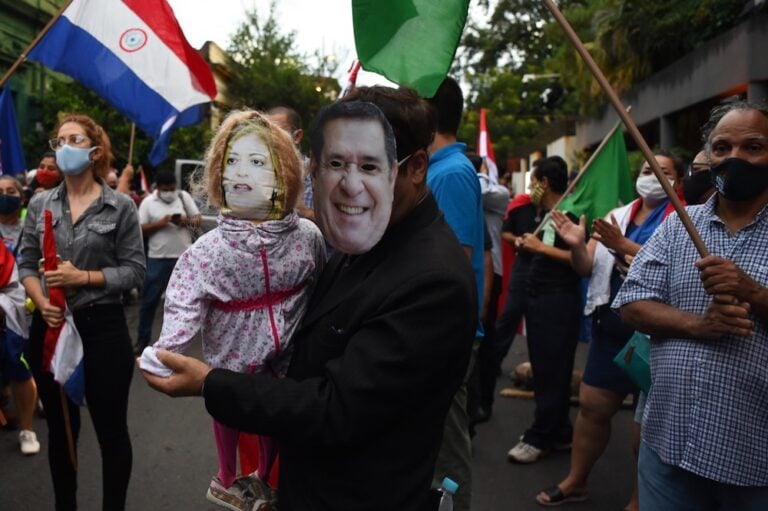The following is based on information from FIP member the Paraguay Union of Journalists (SPP), Asuncion: (FIP/IFEX) – The Paraguay Union of Journalists (SPP) reports an increase in restrictions on freedom of the press and freedom of information, as well as an increase in aggression against journalists, by the new government of Raúl Cubas Grau. […]
The following is based on information from FIP member the Paraguay Union of
Journalists (SPP), Asuncion:
(FIP/IFEX) – The Paraguay Union of Journalists (SPP) reports an increase in
restrictions on freedom of the press and freedom of information, as well as
an increase in aggression against journalists, by the new government of Raúl
Cubas Grau. The SPP calls on international journalists’ and human rights
organizations to denounce such restrictive practices. This situation, set
off only days after the new government assumed power, coincides with a time
of serious political crisis in Paraguay. The SPP considers that the new
government, which assumed power on 15 August 1998, is violating the
principles enshrined in the National Constitution as well as the Universal
Declaration of Human Rights. On 26 August, members of the SPP held an event
calling for an end to the harassment against journalists in Paraguay.
On 20 August, the SPP sent a letter to the President of the Republic
protesting against restrictions applied at the seat of government (el
Palacio de Gobierno). These restrictions impede access for accredited
journalists to the entrances and exits used by people coming to appointments
at government offices. This access was permitted under the previous
governments of Andrés Rodríguez and Juan Carlos Wasmosy. In a response
received by the SPP the same day, Nestor Filartiga, Secretary General to the
President, said that there were no restrictions on reporting and that the
measures adopted were of a “purely administrative nature and correspond to
basic principles of security.”
Nonetheless, later on 20 August, restrictions continued. Basically,
journalists were not permitted to cover the ceremony in which command was
handed over to a new Commander of the National Armada. As well, the press
was prohibited from covering the meeting of the Foreign Minister with U.S.
Ambassador Maura Harty. In both cases, “higher orders” were cited. On the
same day, reporters were also prohibited from interviewing Interior Minister
Ruben Arias Mandoza.
The restrictions continued on 21 August, when journalist José Rojas of
Channel 9, who is accredited at the Palacio de Gobierno, received several
blows from security officials attempting to prevent him from interviewing
the Minister of Public Works, Victor Segovia Ríos, as he left the government
offices. A similar assault against journalist Alfonso Léon of Radio Primero
de Marzo was reported at the Palacio de Gobierno on 18 August.
All of these attacks on journalists were denounced by the SPP to the Human
Rights Commission of the Senate on 21 August. The Commission promised that a
statement would be issued by the Upper House of the Congress. On the morning
of 24 August, members of the SPP held a demonstration outside the Palacio de
Gobierno demanding the total recuperation of the professional and
constitutional rights governing the country’s journalists and rejecting the
violations of the National Constitution and Article 19 of the Universal
Declaration of Human Rights.
These events prove that the fears expressed by the SPP in a statement
released on 14 August, the day before the government of Raúl Cubas Grau was
sworn in, were justified. The SPP expressed fears about the existence of
sectors who wish to turn back the gains made in the areas of freedom of the
press, freedom of expression and freedom of information. These fears arose
as a result of threats against the press made by the “Unace” movement during
the governing Colorado Party’s campaign, and especially the warning by the
leader of the movement and original Presidential candidate, General Lino
Cesar Oviedo, that he was going to “bring the press into line.” General
César Oviedo, accused of leading a coup attempt in 1996, was freed last week
by President Cubas Grau, causing a serious political crisis in the country.
It is also pointed out in the SPP’s statement that the union hopes the
government will, from here on in, commit to defend the principle of freedom
of the press and the right to information, amply safeguarded in the National
Constitution.” In its statement, SPP also points out that “50 years after
the Universal Declaration of Human Rights, journalists demand that its full
force be felt in long-suffering Paraguay and we will not allow threats to
the free exercise of our profession and our rights as citizens to gain the
upper hand.”.


